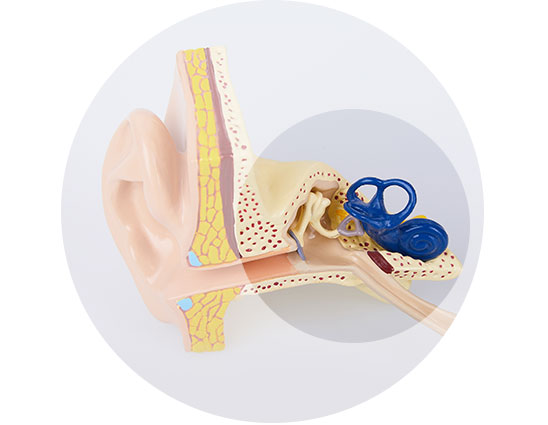Low-frequency hearing loss

What is low-frequency hearing loss?
People with low-frequency hearing loss have trouble hearing low-pitched sounds (sound frequencies at or below 2,000 Hz), like men’s voices and bass sounds in music. The amount of difficulty you have hearing these sounds will depend on your degree of low-frequency hearing loss.
This type of hearing loss mainly affects the volume of low-frequency sounds. So sounds at this pitch may seem quieter than they actually are.

Low-frequency sensorineural hearing loss
Sensorineural hearing loss can result in low-frequency hearing loss, meaning that it's caused by damage to the hair cells in a specific region of the cochlea (in the inner ear).
Since it's the hair cells' role to make sure that sound travels from the outer ear to the brain, damage to these cells can seriously impact your ability to hear properly.

Book a free test for low-frequency hearing loss
What causes low-frequency hearing loss?
Low-frequency hearing loss can be present in both sensorineural and conductive forms of hearing loss. The causes may be genetic in nature or due to a result of a childhood illness.
Common factors that can cause low-frequency hearing loss include:
- Wolfram Syndrome mutation
- Ménière's disease
- Mondini dysplasia
- Sudden hearing loss.
Tip from an audiologist
Since low-frequency hearing loss is less common than high-frequency hearing loss, it is a good idea to be aware of the signs and symptoms. This way you can identify if you might have low-frequency hearing loss – and get professional advice more quickly.
It can be difficult to identify low-frequency hearing loss yourself, since many of the signs are similar to other forms of hearing loss. Just knowing what the signs of hearing loss are and when to take a test are great ways for staying on top of your hearing health.
When to take a hearing test
Signs and symptoms of low-frequency hearing loss
While it might initially seem fairly easy to "get by" when you have some subtle symptoms of low-frequency hearing loss, you will likely begin to miss out on important sounds, which can impact your quality of life.

Treatment for low-frequency hearing loss
Modern hearing aids are able to provide considerable support to people that suffer from this type of hearing loss.
Some people might feel that low-frequency hearing loss doesn't have as much of an impact on their daily lives as high-frequency hearing loss might have. But the effects can take their toll on daily activities as the sufferer starts to experience fewer and fewer of the sounds around them. It's important to get professional advice and support whenever any symptoms of hearing loss occur.
Sources
1. Niskar AS, Kieszak SM, Holmes A, Esteban E, Rubin C, Brody DJ. Prevalence of Hearing Loss Among Children 6 to 19 Years of Age: The Third National Health and Nutrition Examination Survey. JAMA. 1998;279(14):1071–1075. doi:10.1001/jama.279.14.1071
2. Parving A, Sakihara Y, Christensen B. Inherited sensorineural low-frequency hearing impairment: some aspects of phenotype and epidemiology. Audiology. 2000 Jan-Feb;39(1):50-60. doi: 10.3109/00206090009073054. PMID: 10749071.
3. MarkeTrak 10, Marketing Research, Inc.
4. https://www.tandfonline.com/doi/full/10.1080/14992020802215870
5. https://hearinghealthfoundation.org/blogs/tag/Low-Frequency+Hyperacusis
6. https://www.tandfonline.com/doi/abs/10.3109/00206097809080043









